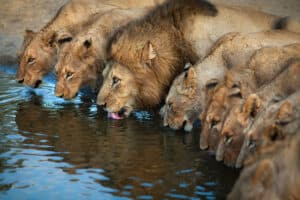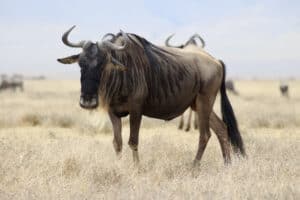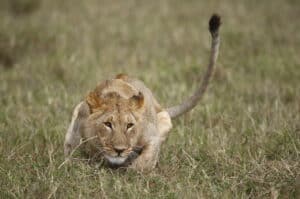The mention of lions is enough to send a shudder down our spines, considering how ferocious they can get. They mostly hunt small and medium-sized animals in the wild, like antelopes, zebras, and wildebeests, which they can easily overpower.
Seeing their hunting behavior and target prey, it is surprising to learn that lions can hunt elephants. Elephants are the world’s largest mammal on land, and while they can satisfy a pride of lions on the hunt, their immense power and build is their defense.
But lions in the Chobe National Park in Botswana try their luck and end up with varying levels of success.
Today, we discover the Savuti lions—a pride so fierce that it hunts down elephants, sometimes successfully.
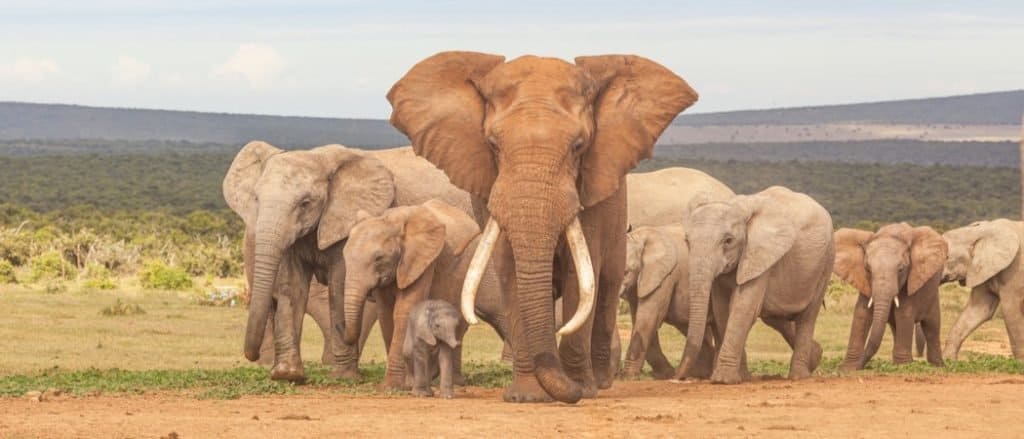
Seeing their hunting behavior and target prey, it is surprising to learn that
lions can hunt elephants
.
©David Steele/Shutterstock.com
The Background
It is unusual for lions to go after elephants, as they are heavy-set and can easily fend off a pride. Instead, humans are the main predators of elephants, courtesy of hunting for trophies. However, it appears the tide is changing for the tuskers as a pride in Botswana’s Chobe National Park seems to fancy their meat.
As per sightings from researchers, the frequency of lions feasting on elephants is increasing. It begs many questions, seeing that this behavior is not common in other ecosystems. The lions primarily target juvenile and subadult individuals, which are pretty small. Sometimes, they prey on larger elephants and successfully put them down.
Recordings show that the pride of up to 30 lions would kill an elephant every three days.
About Chobe National Park
Chobe is the first national park in Botswana and the country’s third largest. Situated in the country’s northern part, it is biologically diverse, featuring several animal species.
Perhaps the most recognizable thing about this establishment is its large elephant population, numbering around 50,000. They are the Kalahari elephants, and their herd size is the largest worldwide. Their population extends to neighboring countries like Zimbabwe.
The Chobe and Linyanti Rivers are the lifelines for the species in the national park, especially in the dry seasons. Many animals converge at the rivers when the drought sets in.
The national park is home to the Savuti lion pride, which has almost 30 individual lions and named after the marsh where the pride resides. The lions are pros in taking down elephants, with the action reported as far as the 1970s.
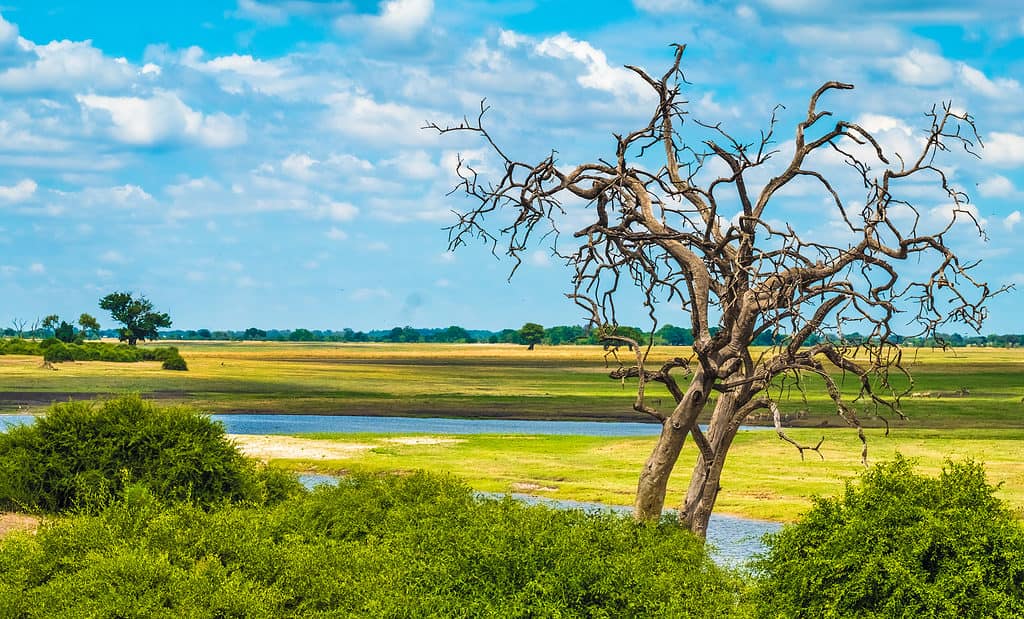
The Chobe and Linyanti Rivers are the lifelines for the species in the national park, especially in the dry seasons.
©LouieLea/Shutterstock.com
Elephant-Hunting Lions of Savuti
Lions of Savuti is a pride of about 30 lions in Chobe National Park’s Savuti region. The mega pride resorts to hunting elephants whenever the Savuti channel dries up.
The lions are reported to have taken down about 74 elephants in three years. This learned behavior has slowly been woven into their offspring’s genetics and can still be observed during Chobe’s winter season.
How Do the Lions Hunt Elephants?
You know how massive they are if you have encountered an elephant before. The Kalahari elephants belong to the African bush species, which are the largest in the elephant family. So it may be surprising how a lion can take down such a giant.
Well, lions are not that small; they have powerful teeth and claws. However, the most redeeming attribute of the Savuti lions that helps them hunt the tuskers is that they move as a pride. The lions will isolate an individual and go for the kill.
They surround it, and each member of the pride takes a hit. Keep in mind that the lions mostly go for young or weak. Furthermore, it’s the lionesses that do the hunting. The males may occasionally join the hunt, especially if the prey is big. They eat the carcass as a pride and may have leftovers for the future.
There are situations where a lone lion can take down an elephant on its own. But, most of the time, the prey is weak or too young to fight off the attacker.
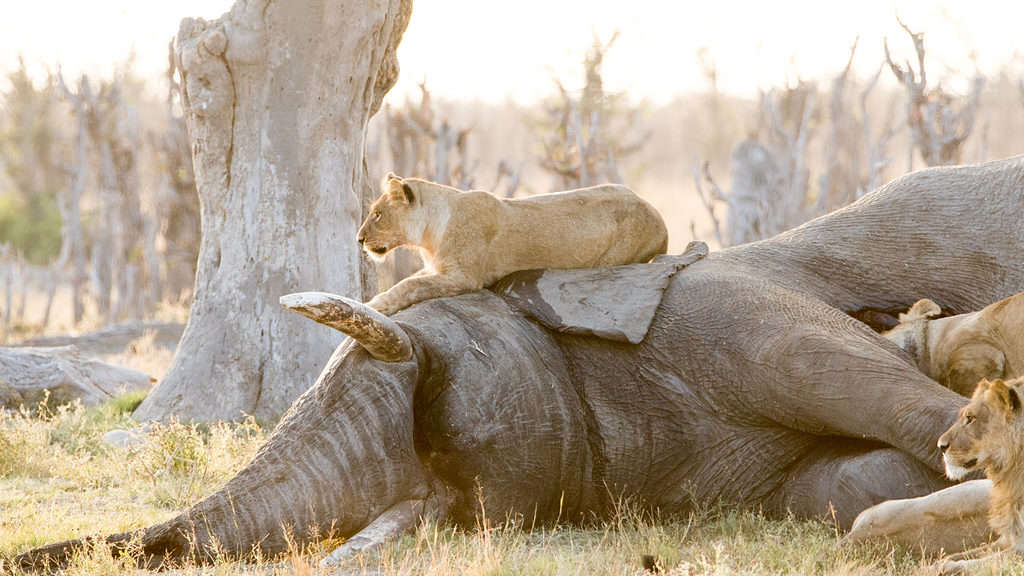
The mega pride resorts to hunting elephants whenever the Savuti channel dries up.
©John WP White/Shutterstock.com
Reasons for Lions Hunting Elephants
As hinted earlier, it is not common for lions to prey on elephants, and the behavior has startled several wildlife researchers and enthusiasts.
The dry season in Chobe runs from May to November, a time characterized by scarcity. Consequently, most herbivores will migrate to look for pasture and water.
With no manageable prey, like zebras, the big cats set their sights on the next possible target, which happens to be elephants. While there may be some prey, the competition from other carnivores, such as leopards and hyenas, is intense.
The peak of the dry season, from late August to November, is intense, and the hunting of elephants increases to the point of scavenging. You heard that right, lions do scavenge, and they will warm up to a tusker carcass if they encounter one. Likewise, an injured elephant can trigger the lion to trail it.
The Lions’ Hunting Advantage
The big cats can overcome the dry season due to their hunting advantage. So let us look at some factors that favor them when they go head-to-head with their fellow big five members.
#1: The Benefit of Numbers
Several skillful hunters in the wild run in a pack. This is the same situation with the lions of Savuti. A one-on-one duel with the elephants will result in a casualty on the lions’ end. As earlier hinted, they attack as a pride, each individual trying their best to put the giant herbivore to the ground.
But elephants move as a herd; why don’t they come to the aid of one of theirs, you may ask. Lions are strategic and will split a weak tusker from the herd and pounce for the kill. They may encounter a stranded calf stuck in mud or lost from the herd if lucky.
They may go for bigger animals when the odds are in their favor. A considerable pride can successfully take down a matured elephant, though with a nasty fight.
#2: Lions Are Opportunistic
Most carnivores are opportunistic, taking advantage of the prey’s weakness. For example, when hunting elephants, they will go for weak individuals. The prey may be sick, young, stranded, or wounded. The fight will be to the lions’ advantage, as they will take them down quickly.
A small pride may wait for a bigger pack of animals, like hyenas or wild dogs, to put the tusker down before they usurp the situation to their benefit.
#3: The Elephants Have a Slight Fighting Disadvantage
Elephants defend themselves using their gigantic frame and tusks. The problem with Kalahari elephants is that their tusks are brittle due to insufficient calcium supply. The smaller ones, which the big cats mainly target, may lack tusks or may be underdeveloped.
Looking at some of the footage of lions hunting elephants, you realize that most attacks happen at night. This is because these large herbivores have poor vision, especially at night. On the other hand, lions are nocturnal, with excellent night vision. It is a mismatch that favors the cats, especially for elephants separated from the herd.
Their big frames may benefit them when charging but act against them when running from the enemy, as they are relatively slow.
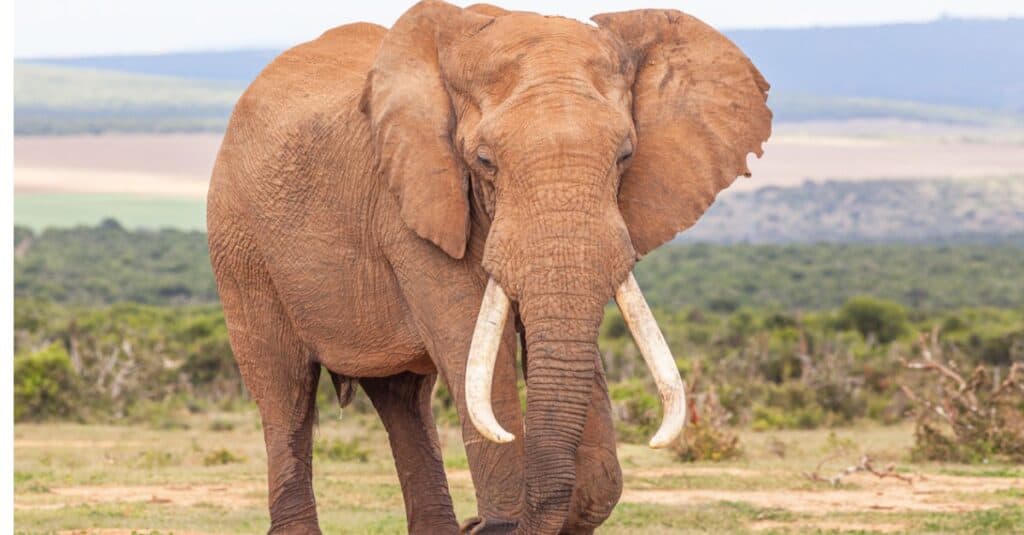
An elephant can reach up to 14,000 pounds, giving it a weight advantage over a lion.
©David Steele/Shutterstock.com
State of the Duel
Lions versus elephants: how do things end up?
If overwhelmed by the pride, the tusker goes down. But there are several situations where the lions are on the receiving end. This is true for large and healthy tuskers, who can easily charge through a pride and send the big cats packing.
Elephants can also bring the number game into the equation, highly disadvantaging the troop. While the tusks may be brittle, they are still effective as weapons. Unfortunately, some overly ambitious lions have been victims of the overgrown teeth.
Sometimes, a cornered tusker may take the fight to the water, improving its chances of survival. Research shows that the matriarchs of the herds know how to steer away from lions for safety. They can recognize their roars and avoid the direction they are coming from.
Effect of Lions Hunting Elephants
The two species are endangered, with dwindling populations in the wild.
But the hunting does not affect their current standing, as it is the natural order of things. The elephant population was, at some point, too high, leading to a strain on the resources. Plus, they damage vegetation. This scenario pushed several key authorities to consider culling to control the population burst.
Many people were against culling, but at least the predation by lions helps keep the herbivores’ numbers in check.
How to Catch the Action
Most of us would want to catch a piece of the action of the two big animals facing off. Videos give a mild taste of the duel, which may not be enough. If you love the dose of adrenaline, you should visit Chobe National Park in Botswana.
The best time to tour Chobe is during the dry season’s peak when you can view the elephant hunters bringing their A-game in the dusty plains. Furthermore, due to the drought, the waterfront becomes the converging point of most herbivores.
Organize a trip early to see how things go down when two mighty wild animals meet.
Is The Park Safe?
You are responsible for your safety when you visit national parks. The park is safe as long as you follow the rules. Always stay in the touring cars and within the indicated limits. Ignoring the rules may lead you to angry and hungry animals that can attack you.
Never get too close to the action, as you risk injury from the scuffle. Furthermore, intruding into the pride’s territory may trigger their aggression.
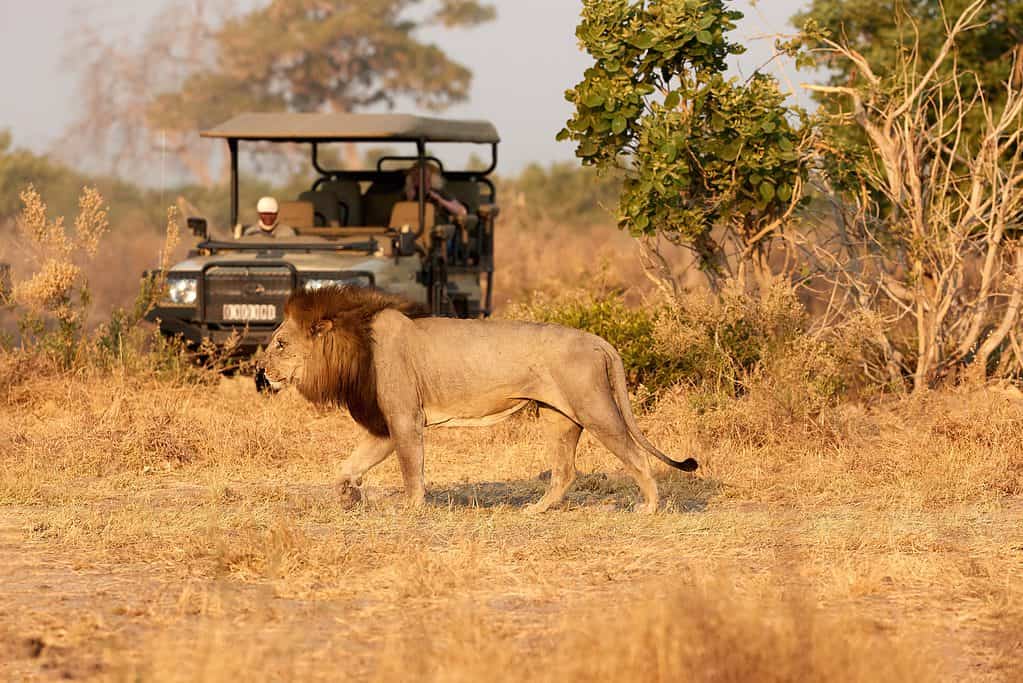
If you love the dose of adrenaline, you should visit Chobe National Park in Botswana.
©Martin Mecnarowski/Shutterstock.com
Other Places You May Spot Lions Predating Elephants
While Chobe National Park is the primary place you will notice this preying behavior by big cats, it happens in other parks, too, though on a small scale.
Madikwe Game Reserve in South Africa is one place where you may find a few cases of lions going for elephants.
Amboseli National Park in Kenya is home to several tuskers, and lions will sometimes try to go for the kill. The elephants in this national park are aggressive and chase the big cats away. Occasionally, the lions may pounce on a stranded fellow and get lucky.
Final Thoughts
Lions are excellent hunters, explaining their tag as the king of the jungle.
Typically, they prey on zebras and antelopes, which are easy to take down, even by a lone lion. However, lions of Savuti take the challenge to the next level by targeting elephants.
The pride, which calls Chobe National Park home, has around 30 individual lions who are pros at hunting elephants. Stories about the pride claim that they have been trailing elephants for a long time, as far back as the 1970s.
It would be a fantastic experience to capture the two members of the famed Big Five in a duel. You can organize a trip to the national park in Botswana for a front-row sight of the lions taking down vulnerable elephants.
Bonus: Do Lions Ever Specialize in Hunting Humans?
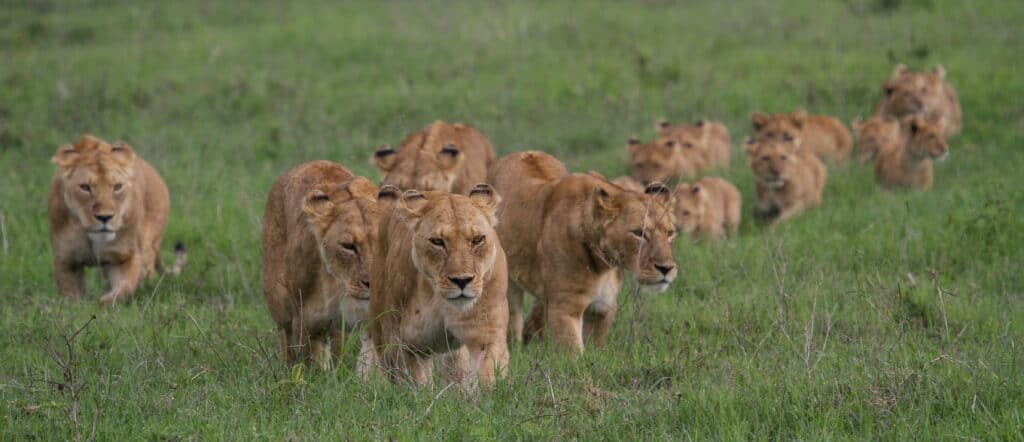
There is at least one pride of lions that specialized in hunting humans.
©Adalbert Dragon/Shutterstock.com
Lions, for the most part, regard humans as fellow predators rather than prey. There have been cases of lions attacking and eating humans – incidents of a person being in the wrong place at the wrong time. Lions are, after all, opportunistic hunters ready to take advantage of a situation. There was one case of a pride, like the one who perfected the art of hunting elephants, that mastered the ways of bringing down people – slaughtering more than 1,500 before their spree was finished.
The Man-Eaters of Njombe terrorized a community over the course of 15 years – from 1932 to 1947. Three generations of lions learned the trade from their elders – who most likely began to hunt people during a dry spell when other prey was unavailable. Like the elephant hunters, these lions hunted humans by night when they were most vulnerable. The second and third-generation man-hunters had always known the taste of human flesh and even began preferring it to their more traditional prey. Nearly 100 people per year were were killed and devoured by the pride. Eventually, a hunter named George Gilman Rushby was brought in to hunt down the notorious man-killing beasts.
In 2006, in the same area of Tanzania, lions began the same practice – killing more than 40 people, sometimes dragging them from their homes. Is it possible that Rushby missed a few of the Man-Eaters of Njombe – enabling them to pass down their terrible knowledge? We may never know but one fact is crystal clear – lions will always be a threat to humans who live within their range.
The photo featured at the top of this post is © Riaan van den Berg/Shutterstock.com
Sources
- Sun Destinations, Available here: https://www.sundestinations.co.za/blog/teagan-tracks-the-famously-savage-lions-of-savuti/
- Lonely Planet, Available here: https://www.lonelyplanet.com/articles/best-national-parks-botswana
- Reuters, Available here: https://www.reuters.com/article/us-botswana-hunting-idUSKCN1QB15O
FAQs (Frequently Asked Questions)
Why do these lions hunt elephants?
With no manageable prey, like zebras, the big cats set their sights on the next possible target, which happens to be elephants. While there may be some prey, the competition from other carnivores, such as leopards and hyenas, is intense.
Where can you go to possibly witness lions versus elephants?
While Chobe National Park is the primary place you will notice this preying behavior by big cats, it happens in other parks, too, though on a small scale. Madikwe Game Reserve in South Africa is one place where you may find a few cases of lions going for elephants.
Amboseli National Park in Kenya is home to several tuskers, and lions will sometimes try to go for the kill.
Thank you for reading! Have some feedback for us? Contact the AZ Animals editorial team.



